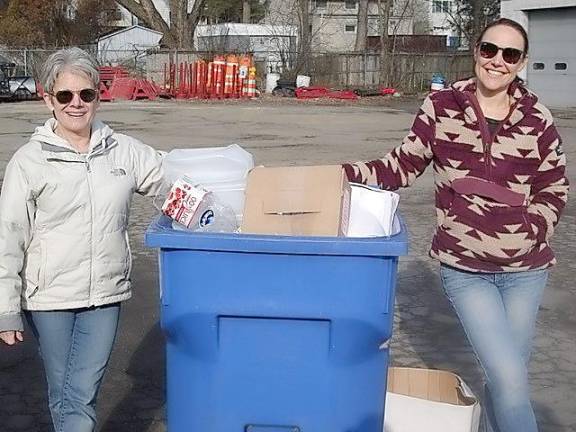Goshen residents spread the word about the proper disposal of waste and recyclables
Goshen. Local environmentalists Betsy Dunlevy and Christine Cullen Schepps have taken the lead in educating residents on what can and cannot be tossed into the recycling bin. “If the wrong things are put into the recycling bin, the whole batch is wrong and discarded, but the village still pays for it,” Dunlevy says.

By Geri Corey
With the population exploding worldwide, recycling is becoming ever more vital to the survival of our planet. Natural resources like timber, water and minerals are being stretched to the limits, so other means of meeting the needs of the population have to be uncovered and used.
Instead of tossing used items in the garbage, give thought on how they can be reused, either through repairing, re-gifting or recycling.
All Village of Goshen homeowners are issued a blue bin to collect recyclables, so have your recyclables bin at curbside early each Wednesday when the Goshen Department of Public Works (DPW) comes to pick it up.
At one time, the village received payment for its recyclables, but that has changed. Now the village has to pay for recyclables to be taken for sorting and then ultimately used to manufacture new products. To keep the cost down, which, according to Village Board DPW liaison Anthony Scotto, can run up to $106 a ton, residents are urged to be more diligent with recycling.
Local Goshen environmentalists Betsy Dunlevy and Christine Cullen Schepps have taken the lead in educating residents on what can and cannot be tossed into the recycling bin.
“If the wrong things are put into the recycling bin, the whole batch is wrong and discarded, but the village still pays for it,” said Dunlevy. “A bad batch adds to the cost of the village’s recycling bill.”
Cleaning recyclables before tossing them into the bin is equally important, as the extra food weight also adds to the cost.
When they helped out at Orange County’s booth during Goshen’s seasonal farmers market, the two women talked about environmental issues and what they could do to help. The subject at that time was geared to food waste and getting people to think about the future of the planet.
"We were thinking globally about helping," said Dunlevy. "When we realized we have no control over that level, we knew we had to think locally."
“Help people understand what can and can’t be recycled in our village,” Schepps added.
Scotto said, “We, as residents, go out of our way to try to do what’s right, but we’re still not getting it done properly.”
Said Dunvey, “Keep this thought in mind: When it doubt, throw it out. It’s better than spoiling an entire bin full of usable recyclables.”
We, as residents, go out of our way to try to do what’s right, but we’re still not getting it done properly.” -- Anthony Scotto